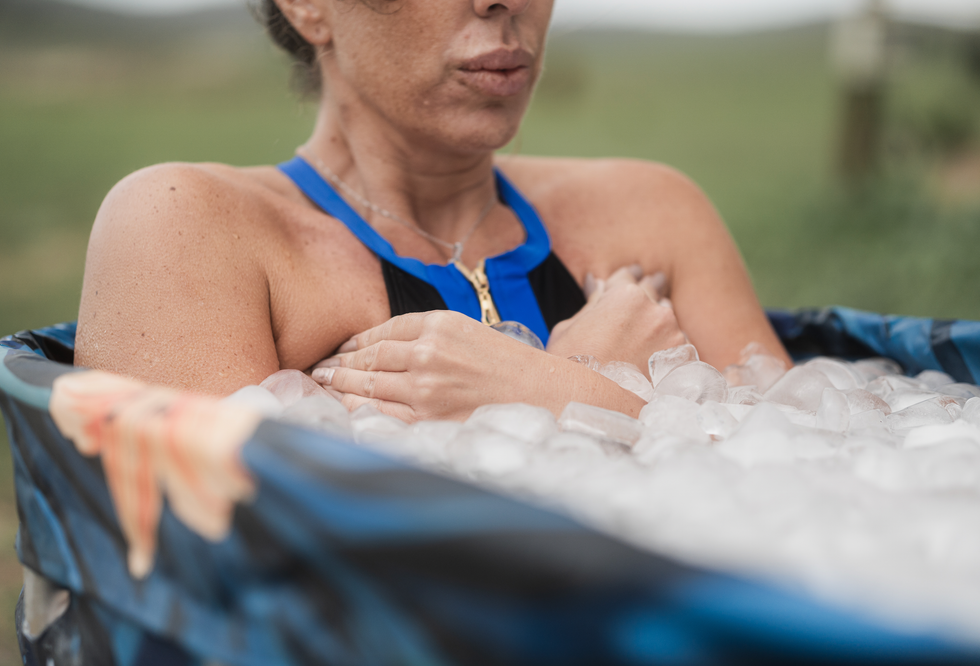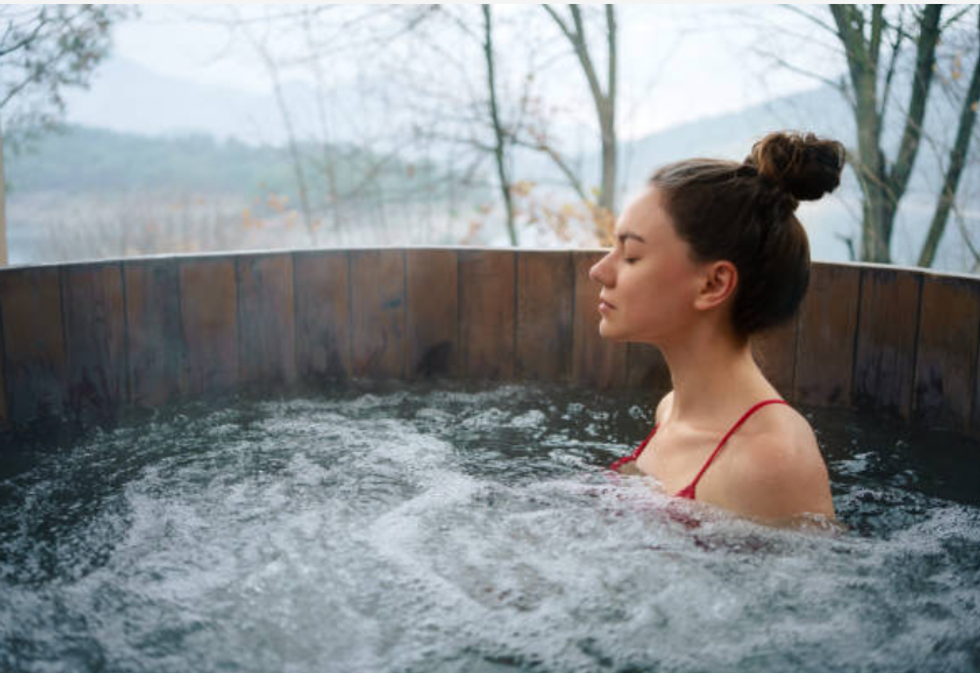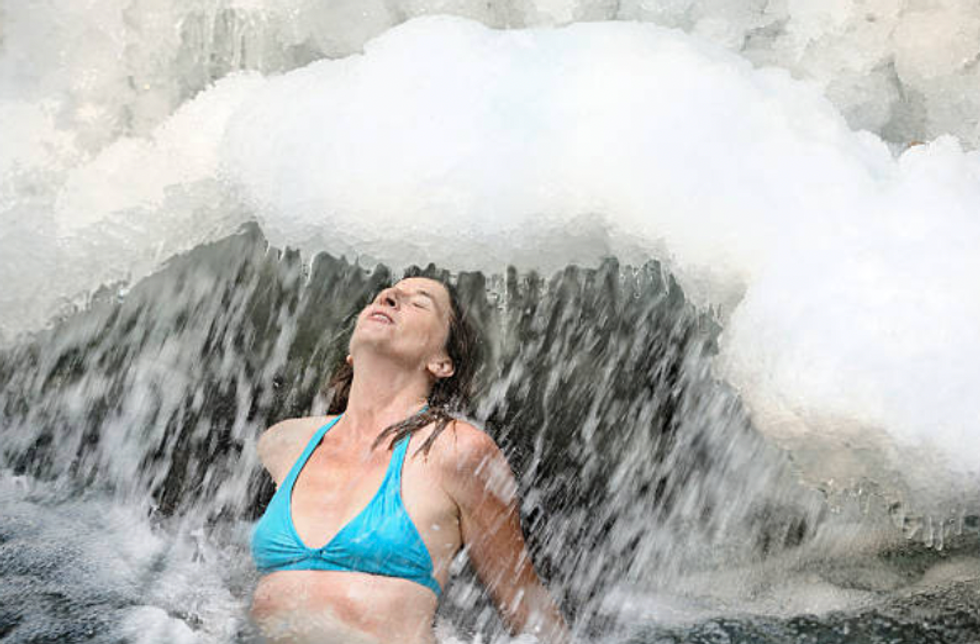GBN Health Check: Do the benefits of cold water immersion outweigh the risks? Experts weigh up the pros and cons

Research suggests cold water immersion benefits the immune system and has anti-inflammatory effects
|Getty Images/GB News

For this week's installment of GB News Health Check, our digital health editor Adam Chapman takes the plunge into ice baths, getting inside the tub with enthusiasts, researchers and doctors to understand the risks and benefits of the latest celebrity craze.
Don't Miss
Most Read
When did ice baths become a thing? Your correspondent first became aware of the practice as a runner.
Coaches would talk up the endless benefits of a cold plunge, such as aiding muscle recovery after a strenuous session.
It wasn't until celebrities such as Joe Wicks and advocates such as Wim Hof, aka "The Iceman" came online a few years back that it became the wellness trend we recognise today.
That is not to say it's a 21st century phenomenon.
On the contrary, "historians believe that people were submerging themselves in ice cold water back in ancient Rome and Greece, as well as other civilisations", Doctor Lubna Khan-Salim, Aesthetic Surgeon of Time To Bloom tells GB News.
"Diving into cold water has a long history in Scandinavia too where the therapeutic benefits have been touted for centuries."
Finnish ice bath expert and Flash Pack guide, Kyle Miller is very much keeping this Nordic tradition alive.
The 41-year-old has found the restorative benefits of ice baths to be an integral part of his mental wellbeing in Finland.
"Ice water baths are extremely popular with Finnish locals as it’s proven to help with inflammation, muscle fatigue and arthritis," Mr Miller said.
The ice bath enthusiast, who has also drilled a hole into his own back garden that he dips into every morning before his first coffee, told GB News: “Not only is ice water therapy a mental challenge as you battle against your natural instincts to fully immerse yourself in the below-freezing temperatures, it has real-life health benefits from mental clarity and burning calories to improving your white blood cell count and blood circulation.”
Is he onto something?
There is indeed a lot of empirical evidence that suggests the the popular pastime can benefit the body in various ways.
Research suggests cold water immersion benefits the immune system, has anti-inflammatory effects and can even boost a person's mood.

Research suggests cold water immersion can reduce chronic degenerative pain
|Getty Images
One study found that non-local cryotherapy, which involves submerging parts or all of the body into an ice bath, can reduce chronic degenerative pain (such as joint pain in the hands caused by the breakdown of cartilage, also known as osteoarthritis).
Research also shows that ice baths can help reduce the symptoms of delayed-onset muscle soreness, which occurs after an individual performs strenuous exercises such as lifting heavy weights.
"The constriction of blood vessels reduces swelling, also known as inflammation, which provides relief from minor muscle aches and hastens recovery," explained Doctor Dawn Ericsson, Chief Medical Officer at AgeRejuvenation.
This may explain its popularity among celebrities, who typically have strenuous schedules which may involve performing, touring and/or getting into shape for certain roles in films or television shows.
"This can make ice baths an attractive proposition and ideal for recovering from the pressure put on their body and muscles as a result of their occupation," explained Superintendent Pharmacist, Carolina Goncalves of Pharmica.
Evidence also suggests ice baths can help individuals with autoimmune conditions where the immune system mistakenly attacks the joints, causing inflammation in areas such as the hands and feet (rheumatoid arthritis).
This anti-inflammatory potential is worth investigating further, notes Professor James Mercer of the Department of Medical Biology at The Arctic University of Norway and author of a review into the benefits of cold water immersion.
"There is an expanding body of evidence linking inflammation with health and disease," the professor said.
One of the most striking findings to come out of his review was the effect that cold water immersion has on the reduction and/or transformation of body adipose tissue, commonly known as body fat.
This can be considered to be protective against diabetes and cardiovascular disease.
What's more, there may be a psychological dimension to the benefits.
Research published in December 2021 found a single immersion in cold water can help improve a person’s mood.
LATEST DEVELOPMENTS

Single immersion in cold water can help improve a person’s mood, research suggests
|Getty Images
A frostier reception
Even though there is evidence of reduced cardiovascular risk factors in "cold-adapted subjects", the act of cold water immersion still increases the workload of the heart and thus has a large stress impact on the heart, Professor Mercer notes in his review.
Indeed, the sudden increase in blood pressure from cold exposure can affect the heart, making the activity risky for those with preexisting cardiovascular conditions, research suggests.
"A shock response may be possible, which can be dangerous," warned superintendent pharmacist Abbas Kanani of Chemist Click.
He continued: "A person can experience a faster heart rate, higher blood pressure and shortness of breath. It can also cause your body temperature to drop dangerously low (hypothermia)." Left untreated, the pharmacist explains, hypothermia can lead to complete failure of your heart and respiratory system and even death.

Researchers have also found that taking regular ice baths may cause a drop in the body’s levels of neutrophils - a type of white blood cell that helps defend against bacterial and fungal infections.
To mitigate the risks and reap the rewards, starting slow is "key", pharmacist Kanani says.
"You should stay aware of your body and its limits and only try it out for very short periods of time to begin with," he advised.
It's best to use a small amounts of ice and slowly add more, as your tolerance builds you can increase this, the pharmacist adds.
"It's important to keep an eye on the time once you enter the bath so you should set an alarm to be sure you don't stay for longer than intended."
Ms Goncalves also advised caution: "Ultimately, I recommend a careful consideration one's medical history (particularly if they have heart issues) before taking an ice bath."
She added: Due to the risks associated with it for the average person, taking an ice bath should only be attempted under supervision and/or after consulting a medical professional."
Usually the temperature is below 15 degrees celsius, and the duration of the plunge can be anything up to 15 minutes - but definitely no longer, adds Doctor Lubna Khan-Salim.










